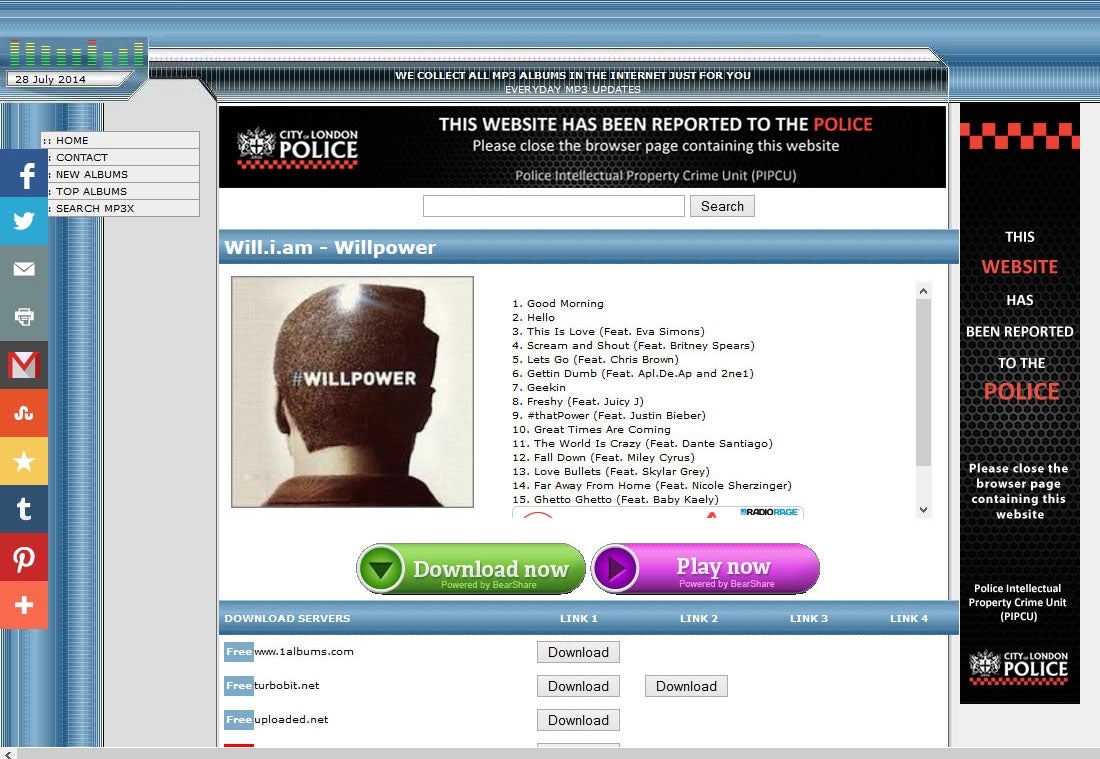Police place adverts on piracy websites
The adverts, which the police do not pay for, tell users: "Please close the browser page containing this website"

Your support helps us to tell the story
From reproductive rights to climate change to Big Tech, The Independent is on the ground when the story is developing. Whether it's investigating the financials of Elon Musk's pro-Trump PAC or producing our latest documentary, 'The A Word', which shines a light on the American women fighting for reproductive rights, we know how important it is to parse out the facts from the messaging.
At such a critical moment in US history, we need reporters on the ground. Your donation allows us to keep sending journalists to speak to both sides of the story.
The Independent is trusted by Americans across the entire political spectrum. And unlike many other quality news outlets, we choose not to lock Americans out of our reporting and analysis with paywalls. We believe quality journalism should be available to everyone, paid for by those who can afford it.
Your support makes all the difference.The City of London police has started placing adverts on sites offering pirated movies and films to dissuade users from downloading copyrighted material illegally.
The adverts warn people that the website they are viewing has been “reported to the police” and ask them to “close the browser page containing this website”.
The new scheme is operated by the Police Intellectual Property Crime Unit (PIPCU) in an attempt to educate users about piracy while simultaneously cutting the advertising revenue for sites that host the content.
PIPCU handles complaints from copyright holders about specific sites and first tries to contact the owner to get them to “correct their behaviour”. If this fails then they can try to have the site taken offline, place their warning adverts on the site or add the site to an Infringing Websites List (IWL).
This IWL is circulated among marketing agencies alongside technology known as Project Sunblock, which are used by brands to ensure their adverts don’t appear alongside inappropriate material such as pornography or pirated content.
"Copyright infringing websites are making huge sums of money though advert placement, therefore disrupting advertising on these sites is crucial and this is why it is an integral part of Operation Creative,” said Detective Chief Inspector Andy Fyfe from the City of London Police Intellectual Property Crime Unit (Pipcu).
"When adverts from well known brands appear on illegal websites, they lend them a look of legitimacy and inadvertently fool consumers into thinking the site is authentic. This new initiative is another step forward for the unit in tackling IP crime and disrupting criminal profits.”
However, some piracy experts have warned that the scheme could also harm websites who are placed on brands’ blacklists by mistake. Speaking to the BBC, Torrentfreak editor Ernesto Van Der Sar said “Without proper oversight, perfectly legal sites may end up losing good advertising opportunities if they are wrongfully included."
Join our commenting forum
Join thought-provoking conversations, follow other Independent readers and see their replies
Comments